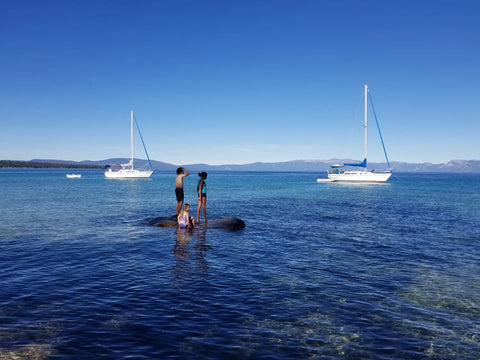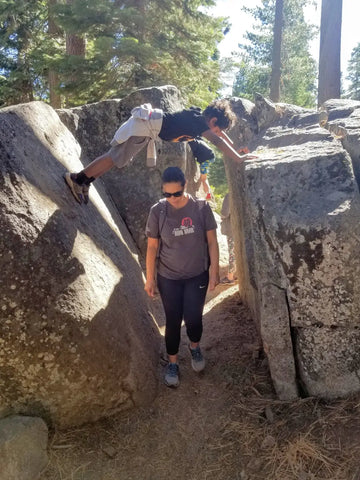What was it like for you growing up, I bet you spent a large proportion of your time outside, whether by choice or not?
I grew up playing outside until it was too dark to play, or I was called inside by my parents. Playing inside was not an option for me and I bet the same for many Gen X parents. There was no XBox to keep us entertained, or "eggsbox" as I like to refer to it - yes, it's my dad joke for this post, please feel free to use it, it’s copyright-free :-).
We live in a world that seems to have folded in on itself and become less social with the exception of all the social media being consumed, which is a topic for discussion in another blog/vlog or podcast.
I personally do not think screen time or social media is good for kids. It stunts their imaginative play, restricts their real world problem solving ability, contributes to their social awkwardness just to name a few negatives.
There are many reasons children are spending less time outdoors and "us" parents are contributing to this shift.
- Children are less comfortable going outside. A survey conducted in the U.S. by the Nature Conservancy found that 80 per cent of children didn’t want to go outside because of the weather and/or being uncomfortable (why is that?). About 49 per cent of children “said they just weren’t interested in spending time in nature.”
- Parents fear children’s safety. Caregivers reported worrying about traffic, dangerous play, and stranger danger as reasons they are less inclined to let their children play.
- Parents and educators want children to spend more time on academics which is thus displacing play. I'm sorry to say this but this is the worst one in this non finite list, kid should be allowed to be kids for as long as they can.
Our family is fortunate to be able to spend a lot of time in nature with our kids. We always try and point out how beautiful it is and that it needs to be preserved and looked after for future generations.
If you are a parent that believes your kid is destined to change the world, in their own way, get them out into nature more often and away from screen time for as long as possible.
Asking your kids specific questions about how they feel about being in nature or about the environment will help them form their own values and opinions about protecting our natural environmental wonder.
If we as parents all help our kids come to this conclusion naturally through their own experiences in nature, we automatically help our future generation protect and preserve our environment.
Benefits Of Spending Time In Nature With Kids
As kids grow, they need more outdoor activities in nature, which is essential for their development. Outdoor activities help foster a lifetime of curiosity and learning besides all the other benefits of being outside.

The benefits of spending time in nature for kids and importance in your child's development
No matter what situation you find yourself, you owe it to your kids to introduce them to the beauty, wonder and magnificence of their home planet.
When kids go out in nature, they are lost in a world of imagination and wonder. Spending time in nature has a lot of benefits that kids and adults can enjoy. The environment enables rapid development for kids. One of the reasons why nature is important to our child is due to the rich sensory environment that nature provides.

When you drill into the reasons why nature is essential in child development, it is easy to see why a day of physical play outdoors is vital. There are benefits to the mind and body of a child as they spend time in nature such as:
- Natural vitamin D
- More exercise and a decreased incidence of childhood obesity
- Increased emotional health
- Increased coordination, agility, and balance
- Less sickness
- Greater focus and self-discipline
- More educational opportunities
- Improved social and cognitive health
- Greater care and concern for the environment
In addition that are many other benefits like providing a playground for learning.
Most of the things we do in nature are an experiment. For kids, it is as simple as wondering what it feels like to hold one of those "green stuff" they see. In their case, the result is usually incredibly significant. Besides, spending time with your kid in nature, answering all their questions and pointing them to things that might interest them, will give you a leg up in science and reading skills.
It builds confidence
The way that kids play in nature has a lot less structure than most types of indoor play. There are infinite ways to interact with outdoor environments, from the backyard to the park to the local hiking trail or lake, and letting your child choose how he treats nature means he has the power to control his own actions.
Builds imagination
This unstructured style of play also allows kids to interact meaningfully with their surroundings. They can think more freely, design their own activities, and approach the world in inventive ways.
Teaches responsibility
Living things die if mistreated or not taken care of properly, and entrusting a child to take care of the living parts of their environment means they’ll learn what happens when they forget to water a plant, or clean the hamster cage.
Gets them moving
Allowing your kids to be active is very important. Spending time in nature with your kids allows them to stay active, which promotes physical activity and overall health. It lowers body fat and strengthens the bones and muscles of your child. Besides, staying on the move has a positive effect on their brain.
Makes them think
Gaining knowledge and increasing curiosity is an essential and natural part of a child's growth. Nature offers your child the opportunity to think and test how things work to develop critical thinking skills. Nature creates a unique sense of wonder for kids that no other environment can provide. The phenomena that occur naturally in backyards and parks everyday make kids ask questions about the earth and the life that it supports.
Reduces stress and fatigue
One of the benefits of spending time in nature with your kids is the restorative effect green space has on the mental health of children. The fresh air provides a much needed calming effect that reduces fatigue and stress. In the long run, spending time in nature prevents psychiatric disorders from developing.
Your view:
We would love to get your feedback on this topic, any gems of advice you can share with other parents would be great. We are after all molding the next generation - let make sure they are amazing human beings.









